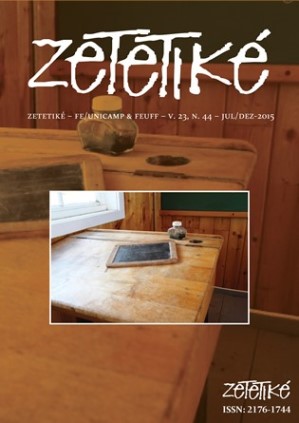Abstract
The main objective of this article is to introduce concepts and theories for the discussion regarding social, cultural, and political influences for pedagogical practice of the teachers. The acquisition of mathematical knowledge in classrooms is related to the students’ sociocultural experiences in the environment they live, thus, it is important to study educational theories that develop mathematical knowledge in order to help students to recognize the importance of their own culture in the development of this knowledge. In this regard, theories of Culturally Relevant Pedagogy and Funds of Knowledge are presented in this article because they use knowledge originating in different cultural contexts. Thus, these methodological approaches use students’ cultural background in order to develop curricular activities that insert and problematize daily practices in the process of teaching and learning mathematics.References
Azevedo Oliveira, D. P. (2012). Um estudo misto para entender as contribuições de atividades baseadas nos fundos de conhecimento e ancoradas na perspectiva sociocultural da história da matemática para a aprendizagem de funções por meio da pedagogia culturalmente rele-
vante. Dissertação de Mestrado profissional em Educação Matemática, Departamento de Matemática. Ouro Preto, MG: UFOP.
Bourdieu, P. (1997). The forms of capital. In A. H. Halsey, H. Lauder, P. Brown, & A. S. Wells (Eds.), Education: culture, economy, and society (pp. 40-58). Oxford, England: Oxford University Press.
D’Ambrosio, U. (1998). Etnomatemática: arte ou técnica de explicar ou conhecer. São Paulo, SP: Ática.
Fauvel, J., & Van Maanen, J. (2000). History in mathematics education: the ICMI study. Dordrecht, The Netherlands: Kluwer Academic Publishers.
Gandin, L. A., Diniz-Pereira, J., & Hypolito, A. M. (2002). Para além de uma educação multicultural: teoria racial crítica, pedagogia culturalmente relevante e formação docente. Entrevista com a professora Gloria Ladson-Billings. Educação & Sociedade, 23(79), 175-293.
Gay, G. (2002). Preparing for culturally responsive teaching. Jounal of Teacher Education, 53(2), 106-116.
Gerdes P. (1988). On culture, geometrical thinking and mathematics education. Educational Studies in Mathematics, 19, 137-162.
González, Z, N., Andrade, R., Civil, M., & Moll, L. C. (2001). Bridging funds of distributed knowledge: creating zones of practices in mathematics. Journal of Education for students placed at risk, 6(1-2), 115-132.
Hogg, L. (2011). Funds of knowledge: an investigation of coherence within the literature. Teaching and Teacher Education, 27(3), 666-677.
Howard, T. C. (2003). Culturally relevant pedagogy: ingredients for critical teacher reflection. Theory into Practice, 42(3), 195-202.
Ladson-Billings, G. (1995a). Toward a theory of culturally relevant pedagogy. American Educational Research Journal, 32(3), 465-491.
Ladson-Billings, G. (1995b). But that’s just good teaching: the case for culturally relevant pedagogy. Theory into Practice, 34(3), 159-165.
Ladson-Billings, G. (2006). Yes, but how do we do it? Practicing culturally relevant pedagogy. In J. Landsman, & G. Lewis (Orgs.), White teachers/diverse classrooms: a guide to building inclusive schools, promoting high expectations and eliminating racism (pp. 29-41). Hern-
don, VA: Stylus Publishing.
Moll, L. C., & Greenberg, J. B. (1990). Creating zones of possibilities: combining social contexts. Cambridge, England, Cambridge University Press.
Moll, L. C., Amanti, C., Neff, D., González, N. (1992). Funds of knowledge for teaching: using a qualitative approach to connect homes and classrooms. Theory into Practice, 31(2), 132-141.
Motta, C. D. V. B. (2006). História da matemática na educação matemática: espelho ou pintura? Dissertação de Mestrado, Faculdade de Educação. São Paulo, SP: USP.
Orey, D. C., & Rosa, M. (2008). Ethnomathematics and cultural representations: teaching in highly diverse contexts. Acta Scientiae, 10(1), 27-46.
Radford, L. , & Grenier, M. (1996). Entre les chose, les symboles et les idées... une séquence d’enseignement d’introduction à l’algébre. Revue des Sciences de L’éducation, 22(2), 253–276.
Rosa, M. (2010). The perceptions of high school leaders about English language learners (ELL): the case of mathematics. Tese de Doutorado, College of Education. Sacramento: California State University. Sacramento, CA: CSUS.
Rosa, M., & Orey, D. C. (2005a). Las raíces históricas del programa etnomatemáticas. Revista Latinoamericana de Investigacion em Matemática Educativa, 8(3), 363-377.
Rosa, M., & Orey, D. C. (2005b). Tendências atuais da etnomatemática como um programa: rumo à ação pedagógica. Zetetiké, 13(23), 121-136.
Rosa, M., & Orey, D. C. (2006). Abordagens atuais do programa etnomatemática: delinenandose um caminho para a ação pedagógica. BOLEMA, 19(26), 19-48.
Rosa, M., & Orey, D. C. (2009). Challenges faced by multicultural and multilingual schools in the United States: the case of mathematics. La Salle, 14(1), 29-44.
Sacristán, J. G. (1995). Currículo e diversidade cultural. In T. T. Silva, & A. F. B. Moreira (Orgs.), Territórios contestados: o currículo e os novos mapas políticos e culturais (pp. 83-113).Petrópolis, RJ: Vozes.
Wolff, K. H. (1966). The sociology of knowledge in the United States. Current Sociology, 15(1), 5-25.

This work is licensed under a Creative Commons Attribution-NonCommercial-NoDerivatives 4.0 International License.
Copyright (c) 2016 Zetetiké: Revista de Educação Matemática

